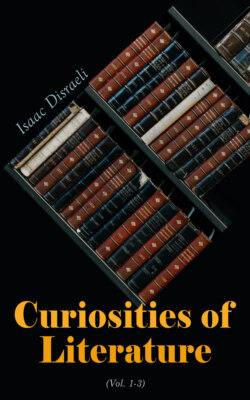Читать книгу Curiosities of Literature (Vol. 1-3) - Disraeli Isaac - Страница 29
На сайте Литреса книга снята с продажи.
PATRONS.
ОглавлениеTable of Contents
Authors have too frequently received ill treatment even from those to whom they dedicated their works.
Some who felt hurt at the shameless treatment of such mock Mæcenases have observed that no writer should dedicate his works but to his FRIENDS, as was practised by the ancients, who usually addressed those who had solicited their labours, or animated their progress. Theodosius Gaza had no other recompense for having inscribed to Sixtus IV. his translation of the book of Aristotle on the Nature of Animals, than the price of the binding, which this charitable father of the church munificently bestowed upon him.
Theocritus fills his Idylliums with loud complaints of the neglect of his patrons; and Tasso was as little successful in his dedications.
Ariosto, in presenting his Orlando Furioso to the Cardinal d'Este, was gratified with the bitter sarcasm of—"Dove diavolo avete pigliato tante coglionerie?" Where the devil have you found all this nonsense?
When the French historian Dupleix, whose pen was indeed fertile, presented his book to the Duke d'Epernon, this Mæcenas, turning to the Pope's Nuncio, who was present, very coarsely exclaimed—"Cadedids! ce monsieur a un flux enragé, il chie un livre toutes les lunes!"
Thomson, the ardent author of the Seasons, having extravagantly praised a person of rank, who afterwards appeared to be undeserving of eulogiums, properly employed his pen in a solemn recantation of his error. A very different conduct from that of Dupleix, who always spoke highly of Queen Margaret of France for a little place he held in her household: but after her death, when the place became extinct, spoke of her with all the freedom of satire. Such is too often the character of some of the literati, who only dare to reveal the truth, when they have no interest to conceal it.
Poor Mickle, to whom we are indebted for so beautiful a version of Camoens' Lusiad, having dedicated this work, the continued labour of five years, to the Duke of Buccleugh, had the mortification to find, by the discovery of a friend, that he had kept it in his possession three weeks before he could collect sufficient intellectual desire to cut open the pages! The neglect of this nobleman reduced the poet to a state of despondency. This patron was a political economist, the pupil of Adam Smith! It is pleasing to add, in contrast with this frigid Scotch patron, that when Mickle went to Lisbon, where his translation had long preceded his visit, he found the Prince of Portugal waiting on the quay to be the first to receive the translator of his great national poem; and during a residence of six months, Mickle was warmly regarded by every Portuguese nobleman.
"Every man believes," writes Dr. Johnson to Baretti, "that mistresses are unfaithful, and patrons are capricious. But he excepts his own mistress, and his own patron."
A patron is sometimes oddly obtained. Benserade attached himself to Cardinal Mazarin; but his friendship produced nothing but civility. The poet every day indulged his easy and charming vein of amatory and panegyrical poetry, while all the world read and admired his verses. One evening the cardinal, in conversation with the king, described his mode of life when at the papal court. He loved the sciences; but his chief occupation was the belles lettres, composing little pieces of poetry; he said that he was then in the court of Rome what Benserade was now in that of France. Some hours afterwards, the friends of the poet related to him the conversation of the cardinal. He quitted them abruptly, and ran to the apartment of his eminence, knocking with all his force, that he might be certain of being heard. The cardinal had just gone to bed; but he incessantly clamoured, demanding entrance; they were compelled to open the door. He ran to his eminence, fell upon his knees, almost pulled off the sheets of the bed in rapture, imploring a thousand pardons for thus disturbing him; but such was his joy in what he had just heard, which he repeated, that he could not refrain from immediately giving vent to his gratitude and his pride, to have been compared with his eminence for his poetical talents! Had the door not been immediately opened, he should have expired; he was not rich, it was true, but he should now die contented! The cardinal was pleased with his ardour, and probably never suspected his flattery; and the next week our new actor was pensioned.
On Cardinal Richelieu, another of his patrons, he gratefully made this epitaph:—
Cy gist, ouy gist, par la mort bleu,
Le Cardinal de Richelieu,
Et ce qui cause mon ennuy
Ma PENSION avec lui.
Here lies, egad, 'tis very true,
The illustrious Cardinal Richelieu:
My grief is genuine—void of whim!
Alas! my pension lies with him!
Le Brun, the great French artist, painted himself holding in his hand the portrait of his earliest patron. In this accompaniment the Artist may be said to have portrayed the features of his soul. If genius has too often complained of its patrons, has it not also often over-valued their protection?
